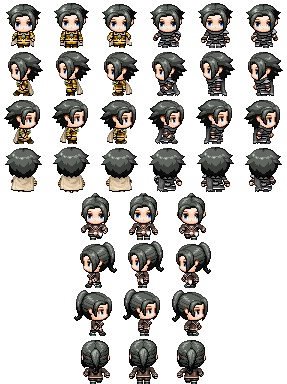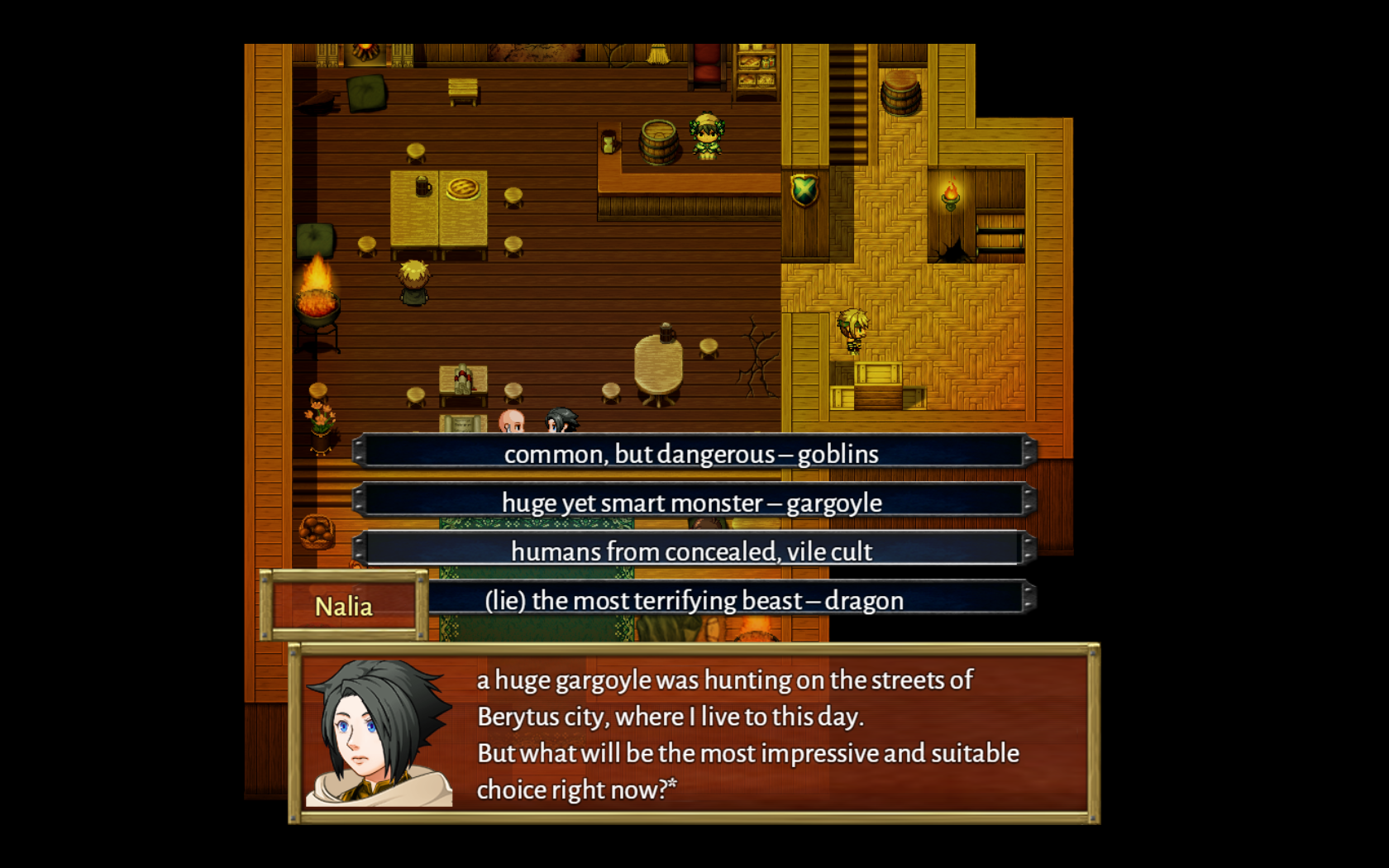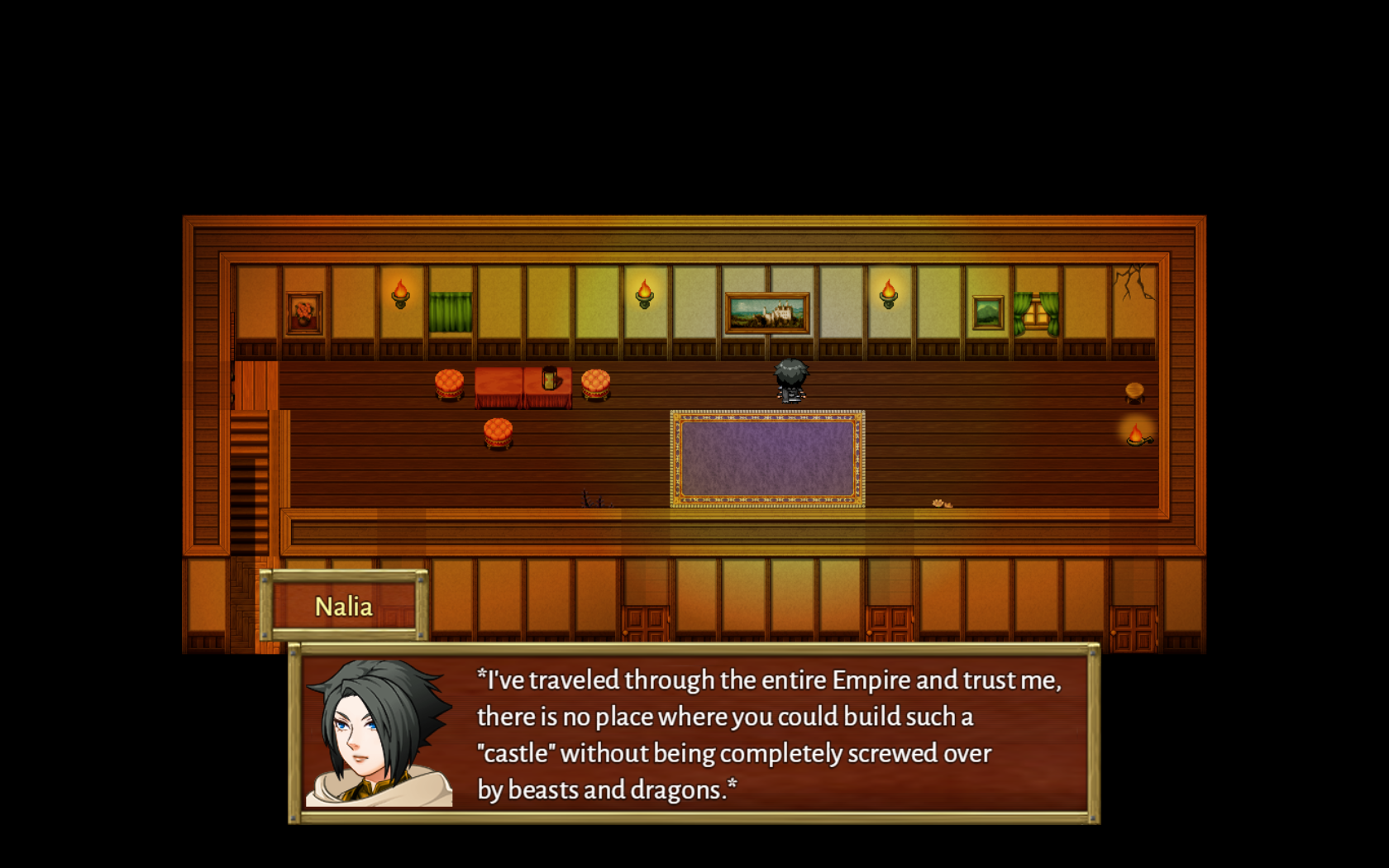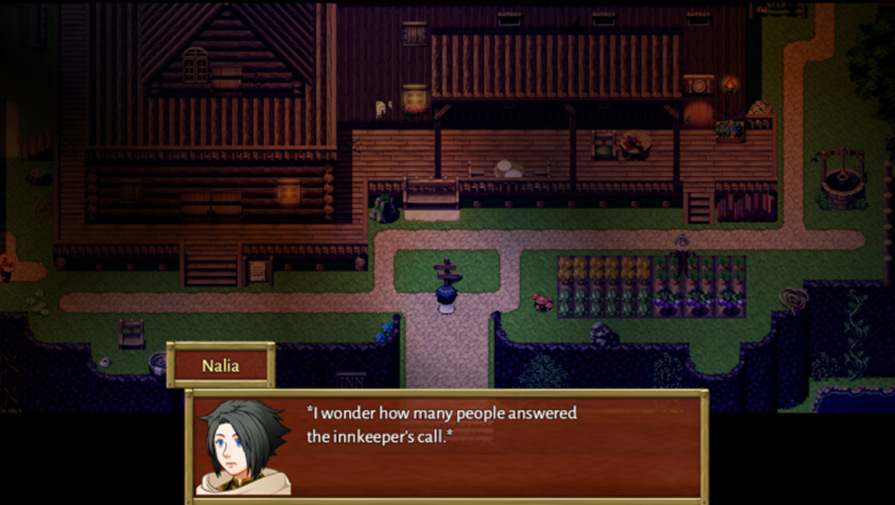Moral Anxiety Studio is getting ready to release its first video game – The Tavern. While the beta tests are in progress and I try to polish the game’s shortcomings, one of the returning topics from the feedback I’m receiving is the unique personality of our main character – Nalia, the heart of our story.

I would like to provide you some insight into the developing process standing behind this character. Not because it is “the best character ever” or because “from now one every single creator has to write their characters using the same tools I used”. However, Nalia turned out to be unusual (and interesting) part of our game and even though I didn’t try to write her as some kind of an antonym of the generic RPG characters, the approach I used to construct her personality, background and perspective could be useful for people who are thinking about making their own pieces of fiction more relatable to a player.
Let’s start with some core design choices:
- The game has a lot of plot branching and the player takes a part in many choices. Because of that, Nalia isn’t just a part of an noninteractive movie and she can’t just throw every word I, as a writer, want her to say. I also didn’t want a passive, ever-listening to exposition “everyman”. Interesting characters are
- Nalia isn’t forced by the game to make only “good” things. “Evil” (or maybe rather “cold”) branches are also available, and our hero isn’t just a vessel for Saving The Planet plot. I wanted the player to see, that his choices are shaping Nalia’s personality, however – those choices couldn’t feel weird, out of place and taken from nowhere. In other words, Nalia needed a common ground for various sides of morality.
- I wanted Nalia to feel real and complex, but also to be an adult. There is more than enough teens (or adults acting like teens) in video games and I didn’t want to introduce stuff that are overused in anime and general pop culture. I crossed out topics like “coming of age”/”where is my place, what do I want from life”/”does he really love me?”. What is good, because it instantly requires additional creativity.

Stereotypes are good, but creativity is better
An extra challenge I took on myself was avoiding stereotypes. I didn’t want my hero to be a skeptical smart-ass tsundere or something like that. She was meant to feel like a real human being. I don’t think stereotypes and generic character templates are Bad, but it’s kind of boring to see them everywhere, isn’t it?
Instead, I wanted Nalia to fit the rest of the game’s world. A grim, dark fantasy universe. And that means I didn’t want her to be just “appealing” to the eye and try to fit player’s fancy without even trying. Nalia isn’t hot. Nalia wears normal clothes and she doesn’t show off her boobs in every possible situation. She is not an attractive cosplay object or rule34 material (if you don’t know what it means, don’t google it – it’s better to not know). She looks normal, because she is normal.
But if normal would also mean boring, the entire idea would completely fail. Nobody, especially me, wants to spend 2-3 hours with a boring character who has nothing interesting to tell. That’s why Nalia has some very strong opinions. She has her unique point of view. She is shaped by an eventful past. Also, she is someone we can identify with not just as a “well, I was in school too, so I guess we have something in common”. I took this part a step further, assuming, that a small indie game can target mature audience. Not everything has to be made for a teen, does it?

I know who I am, I know what I want
Nalia is a single mother. Her husband died during a plague. She lives in a city, but she doesn’t have much luck. She doesn’t work in a bakery making the best cookies in a town. She isn’t the only uncorrupted lieutenant protecting her trusted friends. Actually, she just lost her job. She was a low-rank guard, but the city deputy had to make some cuts. Now people from the streets won’t even trust her.
Previously she was an adventurer, a mercenary, but she settled down and she’s over 30 now. She is not thrilled about a perspective of battle. After all, why would she. Fighting sucks. It can mutilate you. You may die. And if you are a single parent, you risk the future of your children. You need to be careful.
So, you don’t have a job, but the winter is coming and you need some extra savings to keep your family warm. You only know how to fight and hunt for monsters and bandits, but you are not some master-class fencer. You don’t have superpowers. You don’t have a good team to work with. Sure, you have some friends, but not powerful enough to help you get a valuable position. And you need money. Fast.
Since Nalia is a normal human being with a realistic personality, I can imagine and understand her way of thinking. I know why she has to act fast. That she is desperate and frustrated. And I understand when she decides to return to the ways of her past, feel the winds of adventure once again and try to find some easy money outside the city walls.

The feelings and needs that motivate this character are not a result of quick, easy to understand event. Nalia is not following a quest for revenge, test of loyalty, blind passion, lust, lust for power, a prophecy or any other basic plot initiator from mainstream TV series. Maybe it’s just me, but these motivations are very strange and distant for me, while at the same time they are very easy to explain. “He does it because he hates him and he wants revenge” is sort of a writing magic trick which doesn’t need further explanation, but since everyone overuses it, I can’t really get invested in this kind of story.
Nalia’s past reflects in her personality and worldview, but, once again, I tried to avoid using very strong, caricatural features. During the game we see her skepticism and lack of spiritual (and religious) vulnerability. However, she isn’t some kind of anti-religious zealot laughing at stupidity of other people and learning in the end of the story that “gods are real so you shouldn’t be such an ass! we hope you feel dumb now!”.
But, you know. She saw some shit. She saw terrible deeds made in the name of wonderful or terrifying ideas. She saw monsters destroying villages. She saw the fall of saints and the redemption of scoundrels. She felt pain and loss, betrayal and sacrifice. She saw world separated from humanity and beliefs, brought to most basic instincts and survival, but she saw a decadent, corrupted life of comfortable wealth as well.
She understands people can do A LOT to protect what they think (believe?) is important. But sometimes she just can’t hide a smile when someone uses faith to decide about their future. She is used to looking for reasonable explanations, what may be tricky in a world with wizards and undead. However, she tries to understand before she judges someone. She doesn’t blindly follow her emotions. After all… do we?

She isn’t the smartest person you can meet (although sometimes she feels like mentoring younger people), but she has confidence in her experience and wisdom. It doesn’t mean she has to admonish everyone in her sight and act as a sage. But sometimes she is the one telling a story. Unlike in majority of RPGs, my NPCs are not ready to always talk about everything the player wants to hear about. Sometimes they are the ones who want to know what Nalia has to say. From their perspective, Nalia is the an NPC.
Until now Nalia sounds fairly stiff and cold, what is not the plan – she isn’t a martyr, nor a misanthrope. She has friends, felt eros, felt joy when her children survived a deadly illness. She can still trust other people, enjoy a good mead or smile, when she sees some nice flowers. She wasn’t meant to be a tired soul – after all, Nalia wants to be happy and to enjoy her file.
For some time I was thinking about making her an alcoholic, but I dropped that idea. Since the game includes looking for clues, questioning people and making an Nalia herself is an ex-cop, it would push this character into cliché “retired detective” category. And as I said, I decided to avoid convenient stereotypes. Alcohol is still a very present substance in the game’s world and Nalia definitely responds to this presence, but in result it’s just another way to give her more distinct and relatable, without giving her a lazy quirk. (Especially since alcoholism is way too important topic to downgrade it to a secondary character feature.)

The characters live now, not in the past
Another thing to think about is the mainstream overuse of the stories from the characters’ past. One of the core tools used by RPG games is giving an NPC depth by allowing it to freely talk about itself. Just think of the Bioware games. You meat a team member and after some time they “tell you about themselves”. And most of the time it means something important happened to them and they need 3-4 story progression segments to tell you, one part at a time, what was this meaningful story and how it represents their background/explains, why are they the way they are. Once again – it is a great tool and it provides a lot of fantastic gameplay opportunities. However, this path was not appropriate for The Tavern. It is a short game with a lot of dialogue, but the dialogue is focused on the current events or on the relationships between the characters.
There is honestly almost no reason why any NPC would want to just tell you the story of its life, tell you some obviously true legends and so on. Some of them will give you some longer explanations (what basically means exposition), but it is always going to be dictated by the situation they are in and being in need to share with you that information. Once again – the other characters consider Nalia to be a real person and they are not going to passively serve the plot in the name of her convenience. They also have motivations, backgrounds and worldviews, but in majority of the cases you are not invited to just read about them. You, just as Nalia, can interpret the NPC’s actions and have a vague idea what are they up to, but once again – I wanted it to feel immersive, and “realistic” NPCs provide an opportunity to make Nalia feel, well, more human.
It also fits the overall narrative of the game – it uses a small scale, focuses on minor events which, for the characters, are as important as saving the planet is for a Hollywood superhero. There is no reason why low-budget RPG game couldn’t be a story about an everyday hero, and Nalia is a perfect fit for this kind of plot.
When I created Nalia, I didn’t try to focus on making her cute, cool or fitting the generic writing advices. The main questions I had to answer were:
What does the story need? How does this character make the story better? How does it suit the world? Which NPCs are going to be especially interesting while confronting her? How to find balance between realistic, relatable and boring?
The results, I think, are very satisfying and who knows – maybe your story also would benefit from stepping away from Great Heroes 101.



